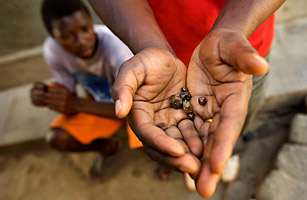By Tara Pistorese
Impunity Watch Reporter, Africa
HARARE, Zimbabwe—Zimbabwean authorities, including security forces and the national army, have recently been accused of beating, torturing, and killing diamond miners in the Marange fields, approximately 250 miles east of Harare.

Four diamond companies are currently operating in Marange. One such company, Marange Resources, says it can produce a minimum of 200,000 carats per month between its three plants. This further supports an expert theory that Marange may be the largest diamond discovery in generations.
One of the most heavily criticized companies, Anjin, maintains a 50-50 partnership with DMC, another diamond company. Military and police officers make up a large portion of Anjin’s leadership board.
According to Global Witness (GW), one of the first non-governmental organizations to expose the international trade in blood diamonds, Anjin’s internal structure creates opportunities for “off-budget funding of the security sector” and “a real risk of these revenues being used to finance violence during a future election.”
After reports surfaced that diamond companies in the area may be assisting President Mugabe to suppress political opponents, the United States, Great Britain, and other countries imposed sanctions.
“It was actually quite shocking that sanctions would be slapped on us even though we are fully compliant by the Kimberley Process,” said Ramzi Malik, project manager for DMC. “So for us we just continue doing our business and doing our thing, and that is the end of it.”
The “Kimberley Process” (KP), an agreement between the UN, the EU, the World Diamond Council, and seventy-five countries and interest groups, requires the close supervision of rough stones in order to ensure legitimate mining and sales activities.
Lately, KP’s failure to implement a system for independent verification has initiated controversy over the system’s effectiveness. Pursuant to this perceived gap, members are still unsure where the diamonds originated or whether the proceeds are used to finance violence or abusive regimes.
As a result, GW has pulled out of KP; however, China and India’s participation in the diamond market has remedied any would-be surplus of diamonds.
President Mugabe and his allies are pushing to have the sanctions lifted. In an effort to put human rights abuse reports to rest, the Zimbabwean government has invited Western ambassadors to tour the controversial fields. The two-day mission will begin on Tuesday.
For further information, please see:
All Africa—Zimbabwe: EU Diplomats Set to Visit Marange Diamond Fields—24 June 2012
Voice of America—Zimbabwe Diamond Policy Won’t Improve Accountability in Marange—22 June 2012
Voice of America—Diplomats to Tour Controversial Zimbabwe Fields—19 June 2012
Human Rights Watch—Zimbabwe: Diamond Abuses Show Need for Reforms—4 June 2012
World Press—Blood Diamonds—15 April 2012
CNN—Inside Zimbabwe’s Controversial Marange Diamond Field—16 March 2012